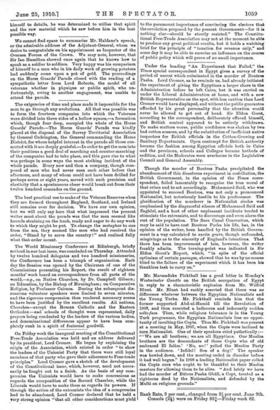Though the murder of Boutros Pasha precipitated the abandonment of
this disastrous experiment in coeciliation, the British Government, in the opinion of the Times corre- spondent, failed lamentably to recognise the true moral of that crime and to act accordingly. Muhammed Said, who was appointed to succeed Boutros, was not only a pronounced Nationalist, but notoriously hostile to his predecessor. The glorification of the murderer in Nationalist circles was emphasised by the disgraceful silence of Mohammed Said and Zaghlul, and a host of other unpleasant incidents tended to stimulate the extremists, and to discourage and even alarm the rest of the population. The Suez Canal Convention, which may be said to have coat Boutros Pasha his life, has, in the opinion of the writer, been handled by the British Govern- ment in a way calculated to excite grave, though unfounded, misgivings as to the sincerity of England's intentions. That there has been improvement of late, however, the writer frankly admits. The turning-point was indicated in Sir Eldon Gorst's Report, which, " in spite of the official optimism of certain passages, showed that he was by no means blind to the failure of the experiment which it has been his thankless task to carry on."






















































 Previous page
Previous page